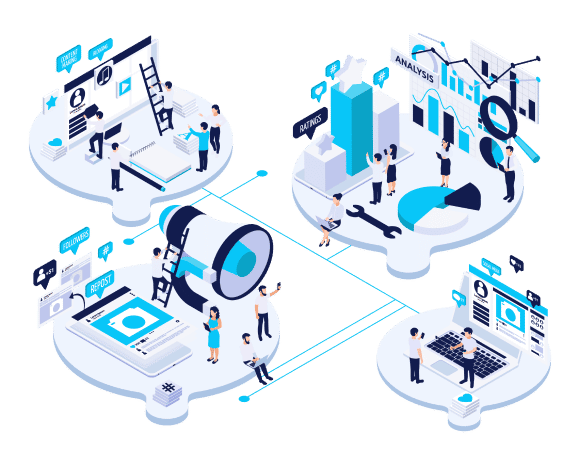Helping With AI Change Management and Implementation Support
By implementing and recalibrating the target operating model through continuous inputs from end users and AI technology vendors, as the business context and assumptions evolve.

Problems Companies Face
When They Need Help With AI Implementation and Change Management
Companies often turn to ElevatIQ after running into roadblocks. They fear failed AI initiatives. They worry about delays, cost overruns, and poor user engagement. Confidence in outcomes starts to fade. Technical issues pile up, but progress stalls. That’s when ElevatIQ steps in—to bring clarity, structure, and momentum.
Fear of Failing AI Initiatives
The AI implementation is not progressing as well as per the expectations. The implementation is full of surprises that were not originally anticipated. Companies seek help from ElevatIQ when they lack subject matter expertise or a proven framework for their AI initiatives.
Limited Confidence On Whether the Technical Efforts Would Deliver on the Target State
Users may be excited about the potential, but often lack confidence that the target state will deliver the promised results. Companies engage ElevatIQ when they're unsure whether their technical efforts will translate into real business outcomes.
Worried About Delayed and Overbudget Implementation
Internal teams often lack the subject matter expertise and confidence needed to drive these initiatives successfully. Concerns about delays and budget overruns are common. Companies turn to ElevatIQ when they need to mitigate these risks and ensure a successful implementation.
Feels Like Spinning Wheels on Technical Issues
Teams often get bogged down in technical issues, unsure how their efforts connect to the target state or promised business outcomes. Companies turn to ElevatIQ when they feel like they’re spinning their wheels without meaningful progress.
Fear of Limited Engagement from Key Users and Stakeholders
Users may understand the effort required to make these initiatives successful, but often lack clarity or conviction about the impact of their own decisions. Companies turn to ElevatIQ when there’s a risk of limited engagement from key users and stakeholders.
Continuously Misaligned Expectations Across Departments
Teams often face competing priorities or conflicting interpretations of the target state. Companies turn to ElevatIQ when there’s a lack of alignment and consensus across stakeholders.
Want to learn more about why independent advisors have a higher success rate with AI initiatives?
Our Case Studies for
AI Implementation and Change Management

ECommerce Supply Chain Transformation With ERP Selection
Download the eCommerce Supply Chain transformation case study and learn how LockNLube transformed its inventory and supply chain challenges by consolidating over 20 systems. As well as by creating business, process, information, and system architecture as they prepare for the next phase of their growth.

Omnichannel eCommerce Customer Experience Transformation
Download the omnichannel eCommerce customer experience case study and learn how fashion retailer AKIRA built a digital roadmap and managed stakeholder expectations to transform its processes and systems to explore newer business models such as buy-online-pickup-in-store and curbside pickup.

ERP Implementation Failure Recovery
Download the ERP implementation failure recovery failure case study and learn how Frederick Wildman struggled with Microsoft Dynamics 365 ERP implementation failure even after spending over $5M and what options they had for recovery.
Our Methodology
for AI Implementation and Change Management
The process begins with data collection, followed by analysis and the development of a tailored questionnaire and RAID logs. Using an iterative approach—combining interviews, process walkthroughs, training, and consensus-building workshops—an implementation plan is created with clearly defined roles, responsibilities, and a communication framework for all stakeholders.

1 Data Collection
This phase focuses on data collection and secondary research to form an initial hypothesis, which is then reviewed and refined through discussion. The output of this phase would be RAID logs and questionnaires.
3 Implementation Plan Execution and Change Management
This phase centers on close collaboration with technology vendors and end users to evolve the target state and recalibrate the target operating model. It emphasizes building stakeholder consensus and addressing resistance before incorporating changes into the implementation plan. Once integrated, user stories, test scripts, release schedules, and cutover plans are continuously updated to reflect the evolving strategy.
5 Hypercare and Post-Go-Live Change Control
This phase implements a controlled change management process to prevent short-term fixes from undermining the target operating model, safeguarding long-term maintainability, sustainability, and adoption.
2Implementation Plan Development and Review
This phase focuses on reviewing the existing implementation plan or creating a new one, including RACI models – assessing the feasibility of user stories, testing criteria, and business process complexity. It also evaluates how these elements impact the target state, along with any identified assumptions and risks.
4Go-live Support and Change Readiness
This phase ensures go-live readiness by closely collaborating with users and AI technology vendors to resolve last-minute concerns and validate the system's stability and functionality before launch.
Ready to learn how we can help With AI Implementation and Change Management?
Our
Other Artificial Intelligence Consulting Services
AI-Enablement Strategy and Planning
Our AI Strategy and Planning begins with a deep assessment of your current challenges, followed by a rapid roadmap outlining multiple paths forward—whether through modernizing existing systems or adopting new technologies. Each option is supported by a detailed business case, highlighting its pros, cons, risks, and potential rewards.
AI-enabled Process and Data Transformation
This service supports clients facing specific process or data challenges and exploring whether AI could be the solution. It's also well-suited for organizations unsure if their issues stem from processes, technologies, or both. ElevatIQ helps define a comprehensive, AI-enabled target operating model that integrates all critical dimensions—agentic and human processes, data, and systems—needed to enable and sustain a successful AI-driven transformation.
AI Technology Procurement Decision Support
This service supports formal procurement processes for AI technologies, including conducting benchmarks to inform decision-making. Once potential solutions are identified, ElevatIQ helps develop a structured RFP and consensus-building framework, source potential vendors, and facilitates vendor engagement—guiding negotiations until the client is fully confident in their selection.
AI Project Recoveries
This service focuses on recovering and rescuing struggling AI projects, including collaboration with technology lawyers for mediation, arbitration, or litigation support. Organizations without a clearly defined target operating model often face operational disruptions and challenges in controlling costs. ElevatIQ conducts a comprehensive assessment—reviewing implementation plans, requirement states, architectural documentation, testing strategies, migration and communication plans, and active contractual obligations—to develop a clear, actionable roadmap for getting the project back on track.
AI-native Cx and Operational Strategy
This service helps companies understand how their peers and competitors are leveraging AI to transform their Cx workflows and operations. It also clarifies how AI-native workflows and experiences differ from traditional, non-AI approaches. As part of the engagement, ElevatIQ develops a rapid roadmap outlining various options—each with a clear view of the pros, cons, risks, and potential rewards.


